We head to Immigration to get our visas.
These are done by 3 different people. One takes the money ($50US each) and
gives us forms to fill in. The next takes our photos and prints them onto a
visa. The third person sticks them in our passports and stamps another page.
Mine will be full soon! Then only a few minutes to get the vehicle paperwork
sorted, no check inside the truck! Welcome to Mozambique.
We are pleased to see tarseal stretching
in front of us and before long we are heading to Pont d’Ouro where our first
night is booked. At the centre of town the tar ends and sandy tracks take over.
We settle into our grassy spot at the top of the hill before heading out to
explore. The beach looks amazing and we hunt down an ATM for some local
currency and then get a Sim. The next morning after walking to a beach with
huge sand dunes we drive down to the main beach to snorkel at the rocks. There
are lots of pretty fish and the water is incredibly clear. When we wander along
the beach, we find a place we can camp much nearer the water and set up there
and stay for not one night, but two. The second day we head out on a boat trip
to snorkel with the dolphins. Sadly, they don’t oblige, but we still get a
chance to snorkel over a deep reef and follow some turtles. That evening we
wander through the scruffy town to a seafood restaurant and discover my new
favourite drink called R&R (rest & relaxation/raspberry & rum)
Delicious.
A final swim and snorkel before we head
out of town. We love you Ponta d’Ouro, but I’m sure there will be more great
beaches. The countryside is flat, sandy, and waterlogged from all the recent
rains. Our route passes through the Maputo National Reserve that is supposedly
full of cranky elephants, although we don’t see a single one. Then before we
know it, we are at the outskirts of Maputo city itself. In the distance we can
see the brand-new suspension bridge that takes us to the city. And beyond that
we see gleaming high rise. As we drive through, we get the feel of a bustling
energetic city.
Our favourite way to see a big city is
to take a slow drive past all the main attractions and through the busy centre.
We get a bird’s eye view without hunting for a carpark and then trying to find
the sights. In this case a carpark would have been near impossible to find as
cars are parked sometimes 3 deep. We spy the Old Train Station, the Portuguese
Fort, the Town Hall, the massive white Cathedral, and the Iron House designed
by Mr Eiffel himself.
Then we drive along the waterfront
passing countless lovely apartment blocks (goodness knows who can afford them
in this very poor country) and a huge glitzy US Embassy. Later we head to Guillaume,
Monica and Luca’s house (A lovely French family we met in Lesotho). They live
in a lovely complex with lots of grass between each home, giving us plenty of
space to overnight in their driveway. Most of the families living here are from
Europe and work here. We meet a group of them that evening around a lovely
shared meal. Thank you so much for having us and introducing us to your lovely
friends.
Saturday morning John goes off to watch 11-year-old
Luca’s football game and I do some paperwork, before we head off. We plan to
hit the beach again. Our first stop is out on the Marracuera peninsula where we
find the lovely Pisane Lodge & Camping. After we settle in, we wander the
deep sand tracks (glad we didn’t try driving down here!) to the beach. It doesn’t
look appealing for swimming so we wander the shore and examine the flimsy boats
pulled up by the dunes. Then back to camp and the lovely pool. The next
morning, we continue our drive. There are coconuts, pineapples, bananas, sweet
potatoes and more. We stop at a long row of produce stalls and once I clamber
out, I am engulfed by people holding up their bowls of produce, all clamouring
for a sale. I am also engulfed by body odour! As we drive, we see so many
things held up for us to buy. Wriggling rabbits, flapping chickens, fish and
even the odd turtle. We finally reach our next beach at Xai-Xai. It is Sunday
and the locals are on the beach and the streets are full of cars. The
Campissimo has a low entry so we follow the very sandy track to a few more camp
spots on our app. Both are closed so we find a back entry to the Campissimo and
stay for the night. No gate or guard, but it proves to be a quiet spot.
Come Monday morning the beach is empty
so we head to the rocks to snorkel, but there is too much current and sand, so
we continue our drive back out to Xai-Xai town and north on the N1. Every so
often there is a toll gate and John is determined to get the lowest rate. Its
50MKZ for cars, caravans & vans. 200MKZ for big trucks. We keep our old
receipts to show them and hand over our vehicle paperwork if necessary. So far,
we have paid the higher amount once. We throw that receipt out!
Back on the main road we continue our
drive north until we spy a glorious aqua lake down by the ocean. We can’t
resist and head down the washed-out track. Once over the inlet the scratchy
bushes crowd us off the track and we give up. It will just be a lunch stop as locals
confirm the camping areas are closed. Sadly, so many places are closed and left
to deteriorate. By the time we reach the old colonial town of Inhambane it’s getting
late, so rather than explore we head to Tofo beach to find the very scruffy
Fatima’s Backpackers where we can camp on a big sandy block. In the morning
head out for a swim before leaving camp to explore Ponte de Barra with its row
of beachfront resorts, before continuing back to Inhambane to explore the
colonial remnants of the town. A rather lovely Cathedral, a smattering of old
houses and a long jetty into the huge bay where ferries still run. Then back to
the main road to continue northwards.
Everywhere there are countless school
children. There are 2 sessions a day so children seem to be coming and going
all day long. As well as walking they jump on the local transport. How many
kids can fit on the back of a ute? Hmmm
must be over 20. Sadly, education is not free and there are over 60 kids in a class!
Our funny sight for the day is a double
mattress and base being loaded onto an oxen cart. Sadly, no photo! Finally, we
take the 13km of terrible track to Morrungulo Beach. It’s a very expensive
campground right on the beach, but the strong sideways rip in the surf and the
long walk up to the swimming pool put us off staying another night.
So, in the morning we set off for Vilankulo,
gateway to the Bazaruto Archipelago. We settle in at the Baobab Backpackers and
try to book a boat trip. While we wait, we wander the waterfront and enjoy
watching the fishing boats, local dhows and ladies at the port sorting fish. No
joy yet with a trip. But when John checks in the morning they find one. Yay. We
hurriedly get ready and find our boat. And what a lovely day we have. Sorry not
a single picture to show you as our small underwater camera decides to play up.
We explore the huge sand island of
Bazaruto, snorkel on Two Mile Reef with fish all the colours of the rainbow,
enjoy a fabulous lunch that include lots of seafood and swim off Benguera
Island. The water glows aqua blue and the sand dazzles in its whiteness. Local
dhows are out fishing. A stunning sight.
The following day we hit the road again
heading inland. Our plan was to go to Gorongosa National Park, but we have been
reliably informed that we would be mad to go from this direction because there
are miles of destroyed tar roads. The recommendation is to go on a back gravel
road which takes us well away from the park. We will visit the Chimaniani
Mountains instead. As we head up the tar road (the main road in this country)
we cross huge sections of destroyed seal which only confirms our decision. We
drive hours and hours and only cover just over 300km. We finally reach Chibamo
and turn onto the gravel road. A definite improvement. It is getting late so we
are glad to pull into Willies mango farm for the night. This great guy offers
his back yard for people like us to camp on.
Another early start as we head along our
back road. There are countless simple villages and so much is happening. It is
Saturday and the kids are all out with their hoes. We stop at one village where
the ladies are pounding dried maize. They kindly let me take photos and all
rush around to look at the photos on my camera. And of course, the kids need to
get in on the action.
Later we turn and head north and find a
sealed road that heads up and over stunning mountains which are part of the
Chimaniani Range. There are bananas growing everywhere and every village and
town has rows of people selling bananas. At the town of Sussundenga we see rows
of buses and the Church is packed with singing, swaying ladies. We stop to
wander the markets and listen to the singing. It has been a day full of
experiences. We round out our day with a drive through the big smoke at Chimioi
where we fill up with diesel (we hear it costs more in Malawi!), argue at the
toll booth that we should pay 180, not 450 – but we lose the battle this time
and finally camp for the night at Lamimos Lodge where there is a nice big
swimming pool.
Another early start this morning as we
head off on a long slow drive, dodging potholes the size of craters. And there
are plenty of trucks to keep us company. We keep seeing guys holding out
plastic bottles with prices on them. They want the trucks to stop to sell them diesel.
A win for the truck drivers and locals, but a loss for the trucking companies!
The main things for sale today are live chickens (the Sunday roast?) and bags
and bags of charcoal. Just before Tete all the trucks and foreign vehicles are
stopped to pay road tax, which we weren’t asked for on entry. Its $10US per
vehicle, but over 3.5T its $125US A massive difference. John works his usual
magic and negotiates the price to $50US. By the time we reach our campspot near
Tete its nearly 4pm. Phew, it is lovely to camp on lush green manicured lawns
right beside the mighty Zambezi River. And as a bonus there is a lovely pool to
cool off in.
Today is our last day in Mozambique and
we have just over 100km to the border. After a drive through Tete town we head off
passing the huge Volcan coalmine and then heaps of very poor villages. The
landscape gets hillier as we near Malawi. Finally, we see a long row of trucks
waiting at the border. Goodbye Mozambique. Fingers crossed that Malawi will
give us a visa.




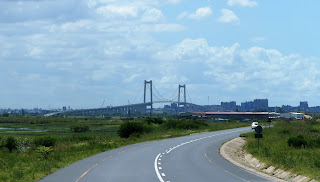





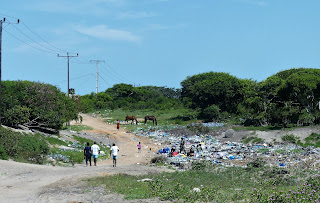




.JPG)
.JPG)
.JPG)

.JPG)
.JPG)
.JPG)
.JPG)
.JPG)
.JPG)
.JPG)
.JPG)
.JPG)
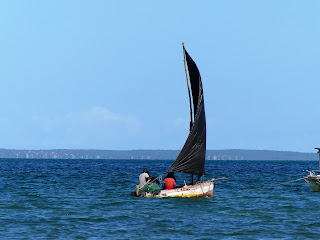
.JPG)
.JPG)

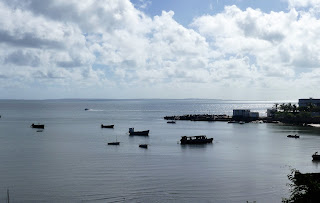
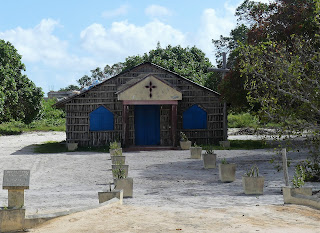
.JPG)
.JPG)
.JPG)
.JPG)
.JPG)
.JPG)
.JPG)


.JPG)
.JPG)
.JPG)
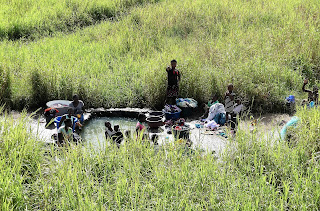
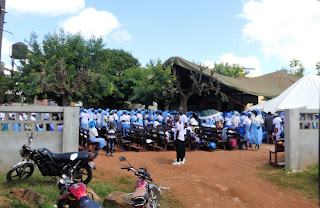
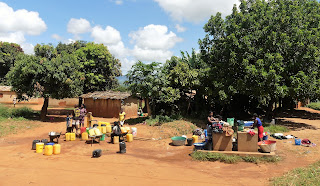
.JPG)
.JPG)




.JPG)
.JPG)

.JPG)
.JPG)

.JPG)